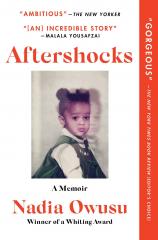Aftershocks: A Memoir
Review
Aftershocks: A Memoir
More than a year ago, I was fortunate enough to read an excerpt from Nadia Owusu’s memoir, AFTERSHOCKS, and it has stayed with me ever since. I was pleased to have the opportunity to pick it up again this week, and was struck by her thoughtful reflections on her own singular life and the life of her family, as well as by the confidence and skill of her voice.
As the title suggests, Owusu structures her book's reflections around the metaphor of earthquakes (and, as it turns out, includes her own recollections of two actual earthquakes as part of her narrative). Sections are titled, for example, “Foreshocks,” “Faults” and “Mainshocks.” She writes about this metaphor: “I have lived in disaster and disaster has lived in me.... When I picture an earthquake, I picture an earthquake. And I picture my mother’s back as she walks away. I picture my father’s tumor and planes crashing into towers. When I picture an earthquake, I picture orphans in Armenia and child soldiers. I picture myself, safe, behind guarded walls. I picture an absence. I hear thunder and silence. An earthquake is trauma and vulnerability; the earth’s, mine, yours.”
"AFTERSHOCKS is both global and deeply personal in scope.... [Owusu] poignantly demonstrates that the stories we tell one another about our lives matter, have repercussions and, yes, aftershocks --- and that includes those we tell ourselves."
As this passage suggests, AFTERSHOCKS is both global and deeply personal in scope. Its wide-ranging chapters recount Owusu’s childhood moving from country to country throughout Europe and Africa and also document a week-long nervous breakdown --- most of which plays out in a curb-salvaged blue chair --- after the end of a relationship in her late 20s.
Owusu is the daughter of a Ghanaian man, descended from Ashanti royalty, and an American woman, descended from Armenian refugees. Their relationship ended when Owusu and her sister were very young, and her mother’s departure from the family was just the first of many abandonments with which Owusu grapples throughout the book, escalating when her father died of brain cancer when she was in her teens.
Given her globe-trotting childhood (her father worked for the United Nations) and her diverse heritage, Owusu also contends continually with questions of identity. These come to a head in one particularly wrenching chapter, when she finds herself one of two Black students at a British boarding school and quickly learns to leverage her lighter complexion to establish herself higher in the social hierarchy. In addition to colorism, Owusu addresses the ways in which contemporary Africans attempt to distance themselves from African Americans descended from enslaved peoples, and she contends with how her view of her own Blackness changed once she moved to the United States, where she has spent her entire adult life.
Initially, AFTERSHOCKS, which freely moves back and forth both geographically and chronologically, can feel a bit disorienting. But once readers grow familiar with Owusu’s voice and with the people and events she describes, the shape and pattern of her narrative become clear. She poignantly demonstrates that the stories we tell one another about our lives matter, have repercussions and, yes, aftershocks --- and that includes those we tell ourselves.
Reviewed by Norah Piehl on January 15, 2021
Aftershocks: A Memoir
- Publication Date: August 3, 2021
- Genres: Memoir, Nonfiction
- Paperback: 320 pages
- Publisher: Simon & Schuster
- ISBN-10: 1982111232
- ISBN-13: 9781982111236




